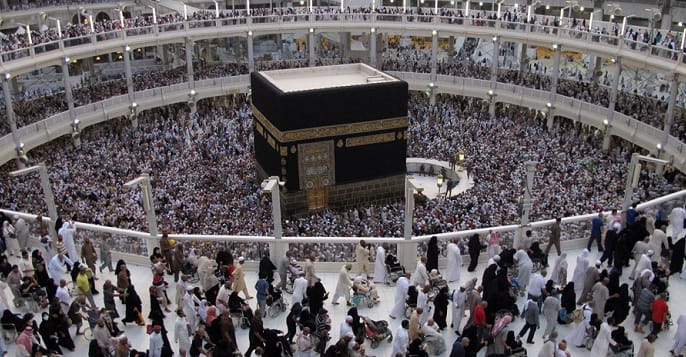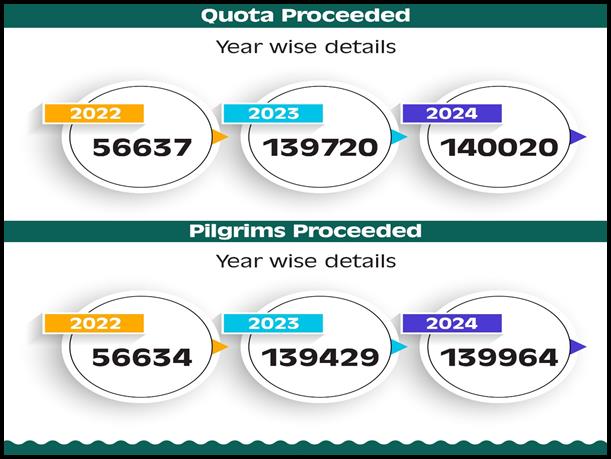Last Updated on November 9, 2024 7:23 pm by INDIAN AWAAZ

Staff Reporter
The union Government has implemented several reforms to make Haj travel hassle-free, significantly enhancing digital infrastructure for better accessibility and convenience.
These initiatives promote women’s equality, allowing more women to undertake the pilgrimage independently. Provisions have also been made to facilitate the pilgrimage particularly for low-income individuals.
In a step towards enhancing accessibility, especially for women, pilgrim support cum facilitation programmes have been introduced. A bilateral Haj Agreement was signed in January this year to establish a total quota of over 1 Lakh 75 thousand pilgrims from India for Haj 2024, with nearly 1 lakh 40 thousand seats reserved for those traveling through the Haj Committee of India.

This year, the Union Health Ministry oversaw comprehensive medical care for approximately over 1 lakh 75 thousand pilgrims, including around 40 thousand elderly individuals aged 60 and above. In response to harsh weather conditions, round-the-clock medical support was provided, featuring enhanced services such as oral health and dental care, based on previous experiences.
Nearly 2 lakh outpatient consultations were conducted, along with regular visits from medical teams to ensure the well-being of all pilgrims this year.
The government has also established robust facilitation centres within Indian Missions to prioritize the welfare and safety of pilgrims abroad. These centers respond promptly to issues raised by pilgrims through various channels, including phone calls, emails, and social media.
Functions of the Haj Committee of India (CHC)
The Haj Committee of India commonly known as Central Haj Committee (CHC) has been established by the Government under the Haj Committee Act 2002, for making all arrangements for the pilgrimage of Muslims for Haj, and for matters connected therewith.
The Committee works under the administrative superintendence of the Government and discharges the following main functions: –
- Annual Conference: Organizes an All-India Annual Conference to review previous Haj arrangements, plan improvements, and finalize the action plan for the upcoming Haj with key stakeholders.
- Public Announcements: Issues announcements inviting applications for Haj through newspapers, detailing deposit amounts, accommodation options, and deadlines.
- Application Distribution: Provides free Haj Application Forms and guidelines to State Haj Committees, which collect applications and remittances from intending pilgrims.
- Quota Allocation: Distributes the Haj quota among States and Union Territories based on Muslim population; excess applications are managed through a draw of lots (qurrah).
- Data Processing: Digitizes applications and transmits data to the Consulate General of India, Jeddah, for managing accommodations and flights.
- Passport & Visa: Coordinates with Saudi Arabian authorities for visa endorsement, with applications processed at the Saudi Embassy in New Delhi and Consulate in Mumbai.
- Data Compilation: Compiles and verifies data, ensuring it is error-free before sending it to various agencies for Haj arrangements.
- Funds Collection: Collects funds based on accommodation choice, utilizes them for rentals and dues, and disburses the balance to pilgrims in Saudi Riyals for daily expenses.
- Foreign Exchange Rate Fixing: Sets the Riyal exchange rate through tenders and finalizes it for the Haj season.
- Airfare Collection: Notifies airfare rates, with pilgrims remitting payments via core banking.
- Flight Scheduling: Allocates flights post-scheduling, notifying pilgrims of departure dates and advising on reporting requirements.
- Embarkation Support: Operates from 21 embarkation points, providing camp offices and assisting with booking, remittance verification, and travel documentation.
- Vaccination Arrangements: Ensures supply of Meningitis and Polio vaccines and certifies inoculations for all pilgrims.
- Distribution of Haj Guide: Provides a comprehensive guide on Haj rituals, logistics, and Saudi regulations in multiple languages.
- Training Programs: Conducts orientation camps with selected trainers who prepare pilgrims for the journey, including private tour operators’ pilgrims.
- Accident Insurance: Implements a Group Accident Compensation Scheme with a one-time premium charged to pilgrims.
- Madina Accommodation: Arranges uniform accommodation in Madina, ensuring most pilgrims stay within 850 meters from key areas.
- Air Transportation: Manages air travel arrangements for pilgrims through Air India and Saudi Arabian Airlines after the cessation of ship voyages in 1995.
Initiatives for Hassle-Free Haj Travel
Over time, the government has implemented several reforms to make Haj travel hassle-free, significantly enhancing digital backbone infrastructure for better accessibility and convenience. These initiatives also promote women’s equality, allowing more women to undertake the pilgrimage independently.
I. ABOLITION OF HAJ SUBSIDY
The Haj subsidy, which aimed to offset travel costs for pilgrims from India to Saudi Arabia, increased from Rs. 10.51 crore in 1994 to Rs. 836.56 crore in 2012-13. However, the subsidy was gradually reduced and completely abolished for Haj 2018. Since then, a record 4.54 lakh Indian pilgrims have performed Haj without subsidy. The estimated savings of approximately Rs. 400 crores from the subsidy have been redirected towards the educational empowerment of minority students, particularly girls, leading to increased enrollment and reduced dropout rates from the schools.
II. REQUIREMENT OF MEHRAM (MALE COMPANION) FOR WOMEN TO PERFORM HAJ REMOVED.
For decades, Muslim women in India have advocated for their right to perform Haj without a Mehram (male companion). Many, including professionals like teachers and doctors, faced barriers due to this requirement. In 2017, the government finally lifted these restrictions, marking a significant milestone, towards women empowerment.
During Haj 2023, the Government of India allowed single eligible women to apply individually under the LWM (Lady Without Mehram) category, eliminating the previous requirement to form a group of four. This change led to unprecedented participation, with over 5,000 women applying under the LWM category—an increase of 20% from the previous year. These initiatives have significantly advanced gender inclusivity and women’s empowerment in the context of the pilgrimage.
Major Initiatives for Haj Pilgrimage 2024
- Bilateral Agreement with Saudi Arabia:
In 2024, a Bilateral Haj Agreement was signed on January 7, 2024, with H.E. Dr. Tawfiq bin Fawzan Al-Rabiah, Minister of Hajj and Umrah, Kingdom of Saudi Arabia (KSA) at Jeddah. This agreement established a total quota of 1,75,025 pilgrims from India for Haj 2024, with 1,40,020 seats reserved for those traveling through the Haj Committee of India. This allocation is particularly beneficial for first-time pilgrims, while 35,005 seats are designated for Haj Group Operators.
- Medical Care Arrangements:
The Union Health Ministry oversaw comprehensive medical care for approximately 1,75,025 pilgrims, including around 40,000 elderly individuals aged 60 and above. In response to harsh weather conditions, round-the-clock medical support was provided, featuring enhanced services such as oral health and dental care, based on previous experiences. This year, nearly 2 lakh outpatient consultations were conducted, along with regular visits from medical teams to ensure the well-being of all pilgrims.
- Facilitation Centres for Haj Pilgrims:
The government has established robust facilitation centers within Indian Missions to prioritize the welfare and safety of pilgrims abroad. These centers respond promptly to issues raised by pilgrims through various channels, including phone calls, emails, and social media. Indian Missions actively monitor the well-being of Indian nationals and are prepared to provide immediate support during emergencies, offering consular assistance, food, shelter, and return passage when needed.
